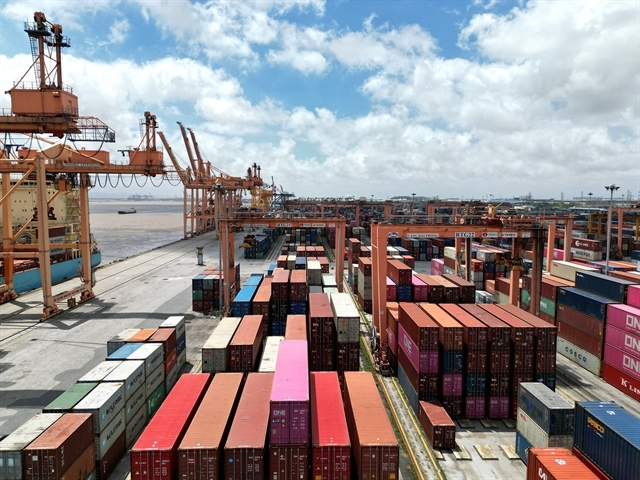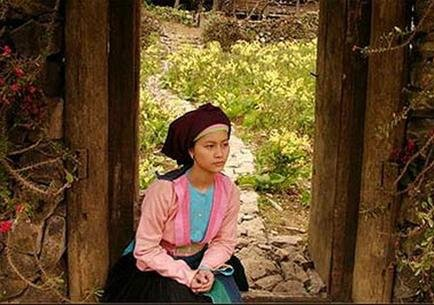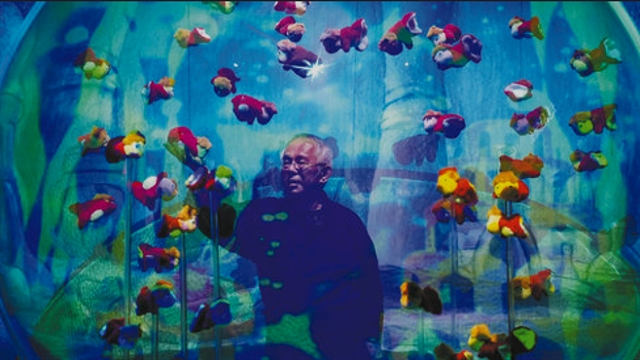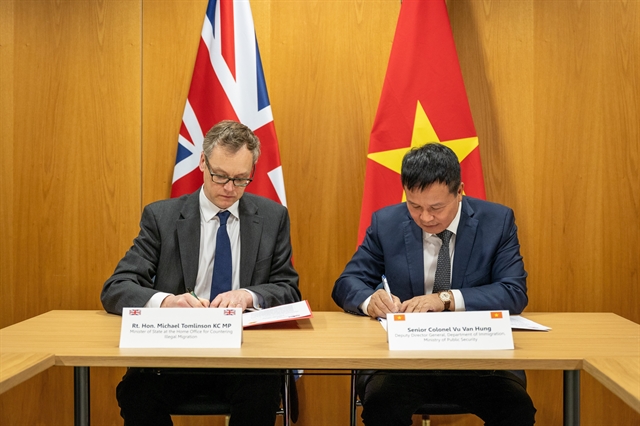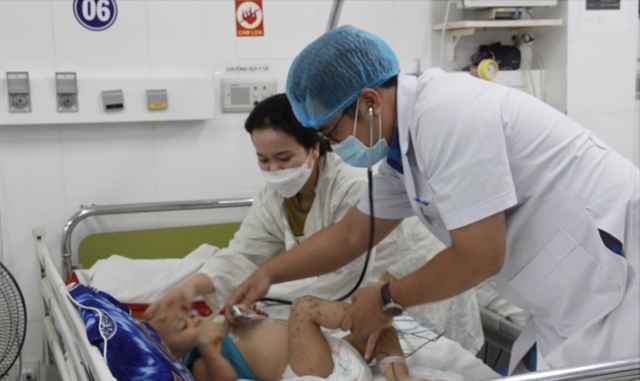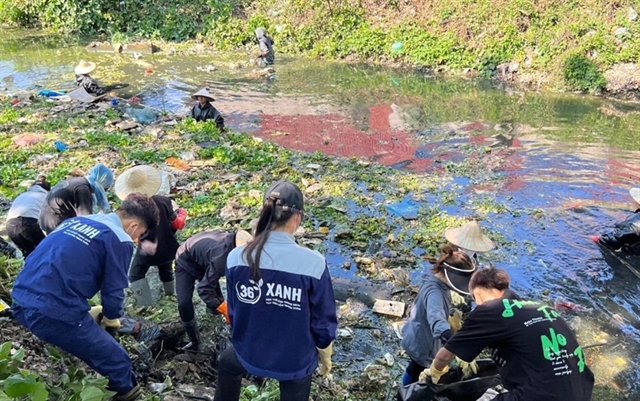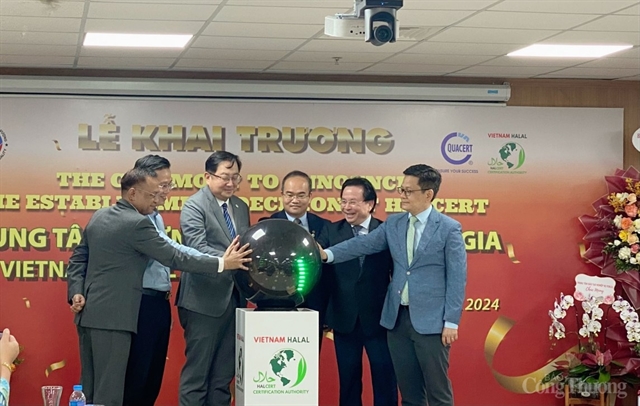

English lessons and education about the environment are being brought to children of poor families in Cần Thơ City. They attend their classes on a boat. Part of their training involves cleaning up a famous floating market in the area.
|
| ||
| Extra-curricular: Student volunteers have begun offering a free class in environmental science, English and soft skills in the floating market area, Can Tho City. –Photo Courtesy of Mekong Youth Impact |
English lessons and education about the environment are being brought to children of poor families in Cần Thơ City.
They attend their classes on a boat.
Part of their training involves cleaning up a famous floating market in the area.
by Hồng Vân
Children of poor families living in the vicinity of the Cái Răng Floating Market in Cần Thơ City are suddenly eager to go to Sunday school.
But this is not a Sabbath school.
Every Sunday afternoon, a group of volunteers hold a special class on a boat. The children who attend the class learn English, soft skills and most importantly, the need to protect the natural environment around them.
This class was opened this September by the volunteers of Mekong Youth Impact, an organisation run by students and ex-students wanting to initiate practical changes in the lives of less privileged children.
“The alarming environmental problems, kids who long for a library and English lessons and students who lack soft skills – these motivated me to start Mekong Youth Impact, which aims to make a change and create a fresh look for the Mekong Delta region, my homeland,” said Trần Anh Thư, 23.
“The state of the environment in the Mekong Delta is alarming and the floating market, an iconic feature of Cần Thơ, is on the verge of disappearing,” Thư said.
She was inspired to organise a free class by a peer education project implemented in Huế City, where kids attend classes and then introduce, share and promote environment protection messages among their peers, those who are from similar background or age and circumstances.
Thus, each student will be an ambassador, helping spread the message of protecting the traditional values and environment of the floating market, Thư said.
Mekong Youth Impact organises a two-hour class every week focusing on three main topics – environmental science, English and reading skills.
Eleven children aged 6-16 participate in a wide variety of activities which include watching movies on environment, going on “field trips”, cleaning up the floating market, cycling, recycling and planting trees. They also play games during the lessons.
“With these practical activities, we believe that children will become more interested and curious about learning and adopting new skills,” said Mekong Youth Impact’s coordinator, Nguyễn Minh Thơ, 20.
“The participants have made definite progress after two months. Some who were hesitant and shy have become more confident and started forming good habits like putting garbage in the right place, refraining from littering in the river, cleaning hands before meals and developing a high sense of punctuality,” said Thơ.
“This progress in the behaviour of children motivates us to continue this job,” said Thơ.
The project faces several challenges.
“Our biggest concern is that funds are insufficient to operate the project for a long time. More parents want to send their kids to these classes, but due to limited funds and availability of facilities and teaching equipment, we can’t admit more,” said Thư.
Mekong Youth Impact got a grant of VNĐ20 million (US$880), which is enough to cover expenses like books, pens, toys, and transportation. It will allow the project to be run until December this year.
“We aim to run the project until the end of 2019, so we are calling for more donors from an ODA fund in Cần Thơ and another organisation in Hà Nội and looking forward to their response,” said Thơ.
Gaining trust
Initially, families living in the area were doubtful about the young volunteers’ capabilities and were not keen on sending their kids.
“We had to go to the boat of every household to persuade parents to allow their kids to participate in our project and the project had to rent a boat to take kids to the class,” said Thư.
But, as the locals see the positive impacts of the project on the environment and kids’ discipline, more people started sending their children to the class on their own volition.
In just two months, the project gained the trust of local residents. They supported the volunteers by lending a boat to hold the class in.
“The children now have some knowledge of the environment and climate change. They can do presentations, engage in teamwork, and more importantly, appreciate the recycled products made by themselves,” Thơ said.
Nguyễn Thị Kim Chưởng, who has two children in the class, said: “My children used to be playful and a bit stubborn, but after they joined the class, they are more obedient and well-behaved. They even inspect their surroundings to see whether there is anyone littering the river.”
“We are warmly welcomed by residents whenever we come. They even give us food as gifts,” Thơ said.
The Cái Răng Floating Market, which has thrived for more than a century as a local commercial hub, offers vegetables, fruits, food for breakfast and even coffee. It is a popular tourism destination in Cần Thơ.
There are currently 26 households who live permanently on boats on the river and the water pollution caused by the daily activities of locals in the area is quite serious, said Thư.
“Not just stale meat and fruit, plastic bags, and cans are also dumped into the river.”
“Starting environment education at early age is crucial. We hope to raise awareness of environmental issues among locals living and doing business in the floating market, so that we can protect this cultural and tourist destination,” said Thơ. –VNS
GLOSSARY
But this is not a Sabbath school.
The Sabbath is a religious day during which followers of a religion do not work.
Every Sunday afternoon, a group of volunteers hold a special class on a boat.
Volunteers are people who work without expecting to be paid for doing so.
The children who attend the class learn English, soft skills and most importantly, the need to protect the natural environment around them.
Soft skills are ways to help you get on nicely with other people.
This class was opened this September by the volunteers of Mekong Youth Impact, an organisation run by students and ex-students wanting to initiate practical changes in the lives of less privileged children.
Ex-students are people who were once students but are no longer students.
To initiate changes means to start the process of changes happening.
“The alarming environmental problems, kids who long for a library and English lessons and students who lack soft skills – these motivated me to start Mekong Youth Impact, which aims to make a change and create a fresh look for the Mekong Delta region, my homeland,” said Trần Anh Thư, 23.
To be motivated means to have a reason to want to do something.
“The state of the environment in the Mekong Delta is alarming and the floating market, an iconic feature of Cần Thơ, is on the verge of disappearing,” Thư said.
If the floating market is iconic to Cần Thơ, people immediately think of the city when they see or hear about the floating market.
If the floating market is on the verge of disappearing it is almost gone but not yet gone.
She was inspired to organise a free class by a peer education project implemented in Huế City, where kids attend classes and then introduce, share and promote environment protection messages among their peers, those who are from similar background or age and circumstances.
To be inspired means to want to go out and do something positive.
Your peers are people the same age as you.
If a project is implemented it is made to happen.
Thus, each student will be an ambassador, helping spread the message of protecting the traditional values and environment of the floating market, Thư said.
An ambassador is a representative.
“With these practical activities, we believe that children will become more interested and curious about learning and adopting new skills,” said Mekong Youth Impact’s coordinator, Nguyễn Minh Thơ, 20.
To be curious means to want to know more.
If you adopt a new skill, you learn how to do something that you did not know how to do before.
“Some who were hesitant and shy have become more confident and started forming good habits like putting garbage in the right place, refraining from littering in the river, cleaning hands before meals and developing a high sense of punctuality,” said Thơ.
If you are hesitant to do something, you do not really want to do it and are likely to think about before doing it or not doing it.
People who are confident believe in themselves.
To refrain from doing something means to not do something you may wish to do.
Punctuality is about being on time.
“Our biggest concern is that funds are insufficient to operate the project for a long time.
Insufficient means not enough.
Mekong Youth Impact got a grant of VNĐ20 million (US$880), which is enough to cover expenses like books, pens, toys, and transportation. It will allow the project to be run until December this year.
A grant is an amount of money given to a project.
“We aim to run the project until the end of 2019, so we are calling for more donors from an ODA fund in Cần Thơ and another organisation in Hà Nội and looking forward to their response,” said Thơ.
Donors are people who give money.
Initially, families living in the area were doubtful about the young volunteers’ capabilities and were not keen on sending their kids.
Initially means “to begin with”.
People’s capabilities are what they are able to do.
But, as the locals see the positive impacts of the project on the environment and kids’ discipline, more people started sending their children to the class on their own volition.
The children’s own volition is their power to do what they wish.
Nguyễn Thị Kim Chưởng, who has two children in the class, said: “My children used to be playful and a bit stubborn, but after they joined the class, they are more obedient and well-behaved.”
To be stubborn means to refuse to change your mind about something even if people are advising you to do so.
The Cái Răng Floating Market, which has thrived for more than a century as a local commercial hub, offers vegetables, fruits, food for breakfast and even coffee.
If a market thrived, it did well.
A century is a period of a hundred years.
A commercial hub is a place people travel to in order to buy and sell things.
It is a popular tourism destination in Cần Thơ.
A destination is a place to which people travel.
There are currently 26 households who live permanently on boats on the river and the water pollution caused by the daily activities of locals in the area is quite serious, said Thư.
Currently means now.
To live somewhere permanently means to live there all the time.
“Not just stale meat and fruit, plastic bags, and cans are also dumped into the river.”
Stale meat and fruits means meat and fruit that is not fresh.
WORKSHEET
State whether the following sentences are true, or false:
© Duncan Guy/Learn the News/ Viet Nam News 2016
1. False; 2. True; 3. True; 4. True; 5. False.


